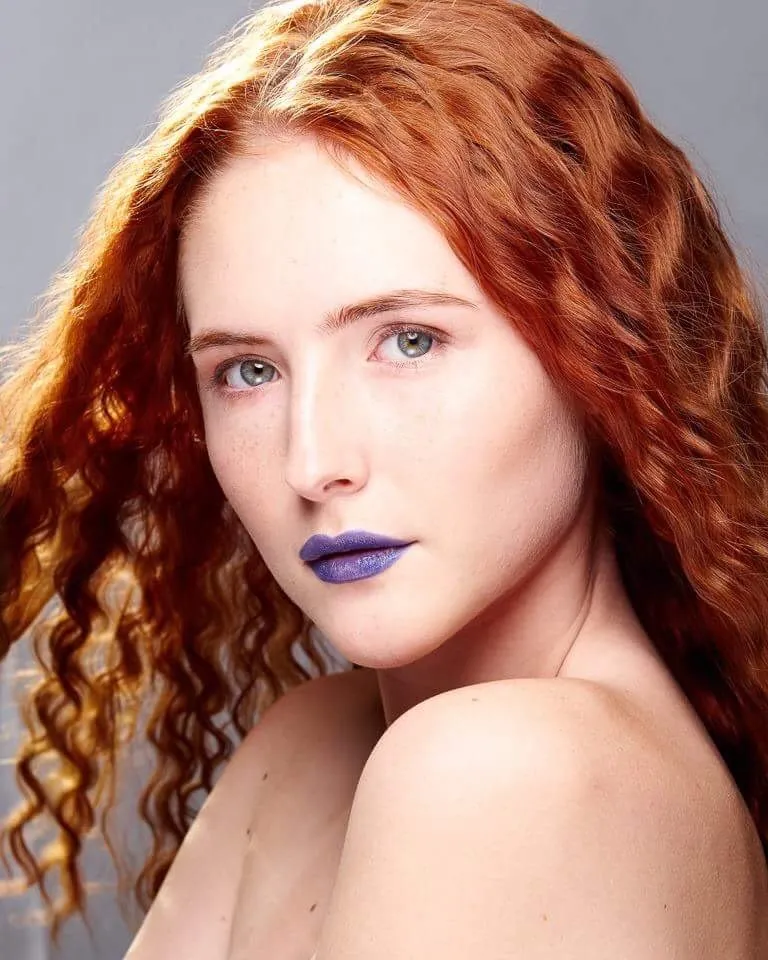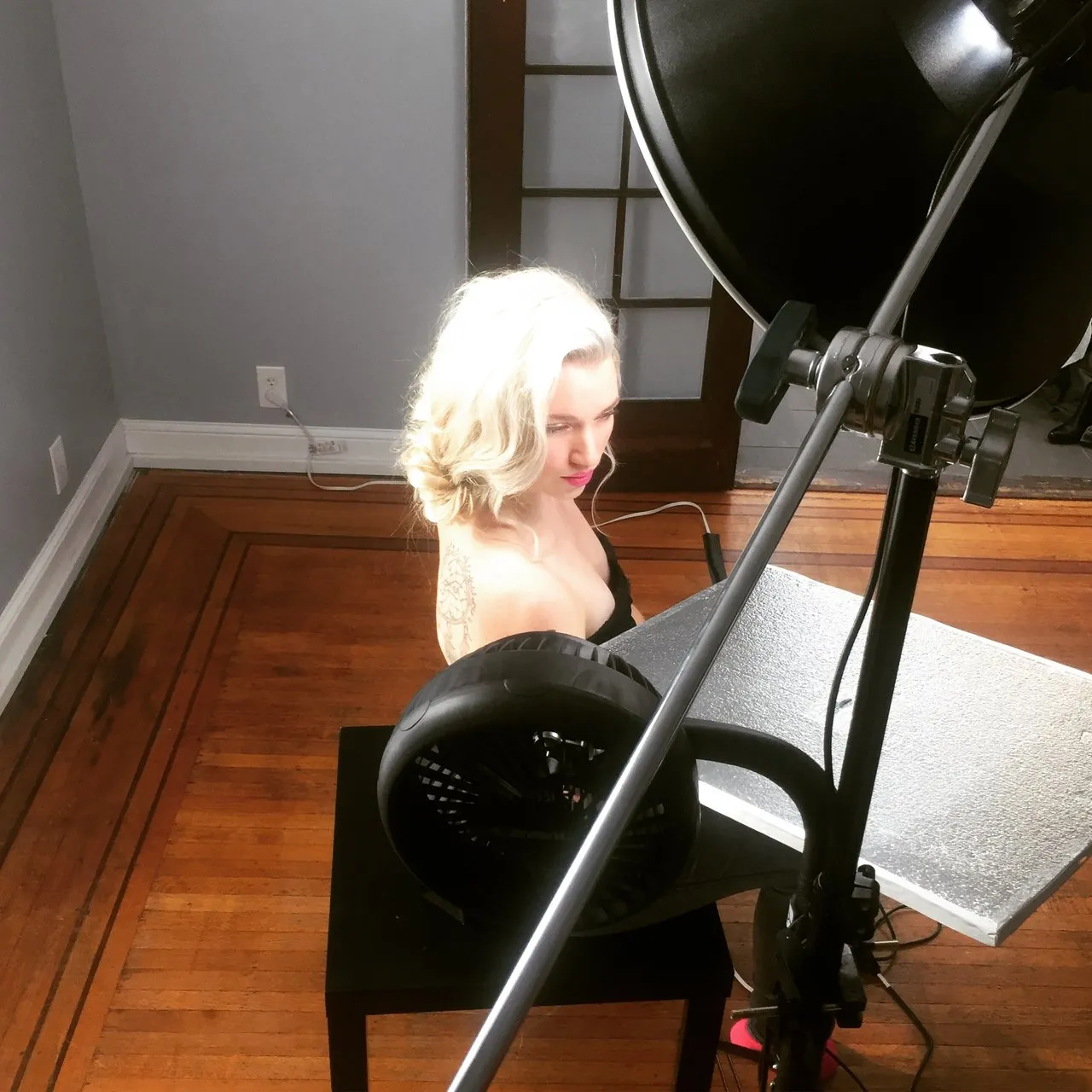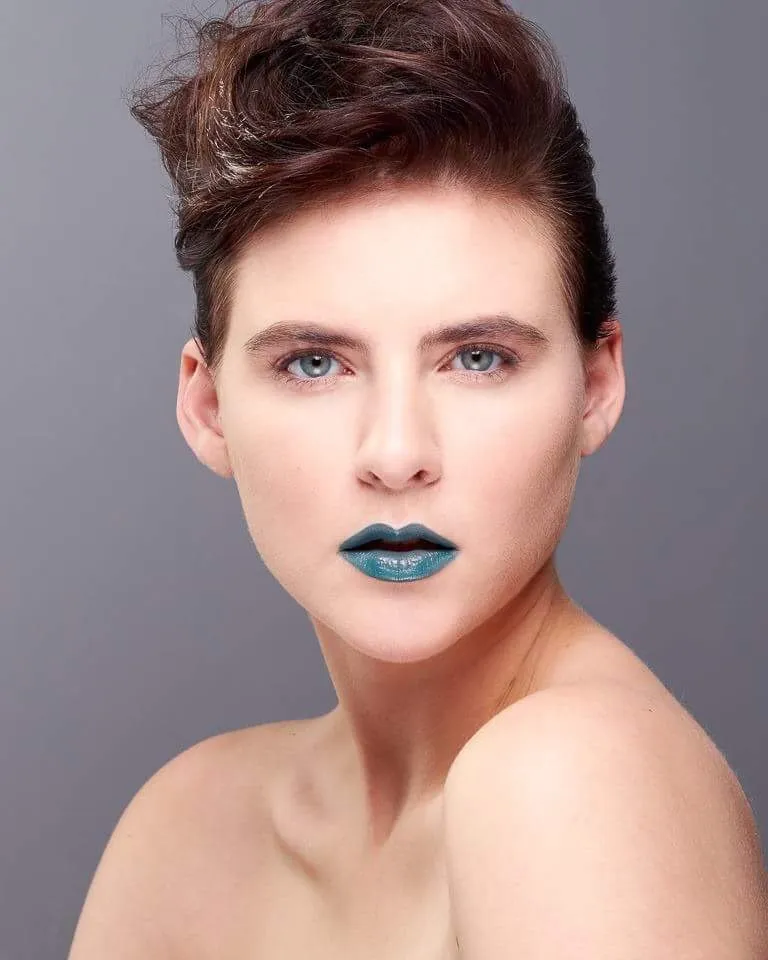
Doing profitable work as an artist isn't always about feeling good versus selling out. The struggle is making money doing what you love, but that's not as big of a struggle as finding value in what you do to the point where you demand reciprocity. Personally, my biggest hurdle, and the biggest hurdle of people that I know, is the self.
In photography, TFP, or Trade for Prints, is common especially in the world of model photography. But with digital photography and its accessibility (you can buy a nice camera at Costco and everyone has access to Photoshop), the line has been blurred for quite some time. Industry professionals in the photography medium (photographers, makeup artists like myself, models, and many others) are now in a saturated fake market. Models have always been preyed upon, but now every woman who wants her photo taken is potentially subject to that kind of treatment. A would-be paying client can now find a skeezy guy with a nice camera to do a free photoshoot for her "as a favor" or "because she could be a model." Photographers in the past have almost always had to either find a person they knew to shoot for free to build a portfolio, or they had to pay someone to be a subject, even when they were still in art school. Models had to pay for headshots. All of this is getting muddled because of social networks and DSLRs. I consistently hear people in my industry saying they feel they have to be the lowest priced to get work, or that its impossible to make money doing what they do, or that they have to compete with people who do it for fun instead of for a living. And I really don't think that is entirely true. Or true at all.

This newish era is forcing us to be more creative, have a brand and be constantly innovating. And also, to check ourselves when we are allowing ourselves to be taken advantage of, or working for free because its better to be doing SOMETHING than nothing at all (we all need exposure and to be curating on social networks, right?).

A few things I have learned in the last decade are:
1. Find a niche or a focus. It should be one that makes you money and one that you enjoy doing. If you fucking hate weddings and like shooting naked girls, then don't shoot weddings and figure out how to make money shooting naked girls. If someone tells you that you can't do it, remind them and yourself that there are plenty of people who make their living that way. There's money out there in doing what you enjoy. Find it.
2. You're going to have to do stuff for free. Figure out which free stuff is beneficial and which are a waste of your time. An aspiring model that's just starting out, has no connections, and isn't very good yet, should pay you (even if she's hot, guys). By accepting her proposal do work with her for free (photography, makeup, hair, wardrobe, whatever), you're doing her a favor and devaluing your work. This is the type of client that would pay you 10 years ago without question. If she's serious and values your work, she will pay you. If those aren't the case, she will find someone who will shoot her for free. Either way, she gets what she pays for and you get to keep your occupational integrity. Alternatively, if you have a model (or even just a friend) with a lot of connections and a huge following, this is the definition of "exposure." Both of these are work you're doing for free. One has a potential payoff and one is crossing your fingers hoping somebody sticks with their newfound hobby and you can say you knew them before they got big.
3. Bigger productions are bigger network opportunities. If you're going to bother doing something for free, do it with as many people you trust as possible. This recent shoot was a trade for everyone involved. During the planning process, which was supposed to just be some headshots with funky lip colors, I asked a master hairstylist if she was free that day and would like some shots for her book. Then I realized I just did a focus group for a new lipstick-making workshop with the owner of a local makeup store that has reach in the drag and burlesque communities. I asked if they would mix up some custom lipstick colors for us and they accepted. These photos are now their ad campaign for the workshops. With everyone you work with, your name needs to be attached to everything. When people hear your name they need to know your profession. And when people hear or see something about your profession, your goal is to make them immediately think of you. The words "exposure" and "networking opportunity" are thrown around, but when a group of people trying to make it, bands together to share who they know and propel a project forward and upward, that's a much better use of time than working for free every day hoping that one day someone will be so kind to pay you.
4. Work smart. This has been my biggest challenge that I caught myself doing. Its the slow season for makeup in Minneapolis where I live (do you want to get married when its -15 degrees outside?) so I have been planting as many seeds as I can and saying yes to whatever I know will produce good representation of my makeup artistry. I thought since I was saying no to gross dudes with cameras shooting poorly-lit photos of amateur girls, I was working smart. But I wasn't. The idea of "I would rather be doing free work than no work" was not serving me. Yes, I respect everyone on the crew and think they're brilliant. I love the images that result. I use the behind-the-scenes snapshots I take as well as the finished images to tell the public (read: potential paying clients) what I am able to do with makeup. But I have a full portfolio, and I have bills to pay. That seems simple but that's a fairly new revelation in my mind and a lot of others. I don't think any of those projects or images are a waste, but they aren't focused on work where I make money, they attract a lot of people who also want me to work for free, and in the end they cost me something. You may have heard the expression, "if you work for free you'll never be out of a job." I can do free work that alludes to my ability to get paid. Who pays me? Brides pay me. So I'm doing free shoots that show my bridal makeup and putting the images in places brides-to-be will see them. Boudoir clients pay me. So I'm doing free shoots that show I have a staged boudoir in my house and I'm doing it with friends who have a wide reach or a lot of fans. Serious models, actors and executives who need headshots pay me. I'm not shooting them for free but I am consciously marketing to them now, diversifying my portfolio to include less dramatic makeup that serves them and I am telling the headshot photographers I know that I want to be the first one they call when a client needs their makeup done.
5. See if your competition is really competition. For a while it was easy for me to get discouraged because makeup is such a huge thing right now. There are even buzzwords and terms for it ("Instagram Brows" is a common one I hear all the time). Pre-teen and teenage consumers are seeing the value in high-end makeup and are seeing it as essential. They're savvy, and they spend time watching Youtube tutorials to learn to do what I do, for free. But guess what? They're not my customer. I can bitch and whine about how the internet makes it impossible for me to do my job in a profitable way, or I can get real and ask myself if this group of customers would hire me if they could, or if they just want to buy products. I don't sell makeup, I do makeup. I don't have a Youtube or Instagram account with sponsorships from companies because my goal isn't to be a sales rep (there's nothing wrong with that, its just a different part of the business I am in) or a beauty blogger. I'm 33 years old, I specialize in airbrush makeup artistry, I want to get out of my house, I have professional skills and my passion is the artistry of applying makeup. So a person with a million followers on Instagram isn't my downfall, they're not my competition and they're not stealing business from me. It is advantageous for me to have visual platforms that make makeup fun and exciting for people to explore. There is no need for me to complain about how they're taking my job when I don't want their job.
6. Be willing to lose work. When someone passes you up because your prices are too high for them, or when someone wants you to work for free and you decline, you're valuing your craft and your bottom line. We work in an industry with poor boundaries (there's no HR department when you're a freelancer) where people will take from you without a second thought if it has the potential to benefit them while acting like its an opportunity for you. When you're broke and someone tells you "I can't pay you $150 but I can do $50," its up to you whether you're in a place to decline or accept that. Sometimes that's the difference between the lights being shut off or staying on. Other times, it's setting yourself up for a string of gigs that pay you less than what you've decided is the minimum you'll accept. Everyone understands the reality that $50 is bigger than $0, but if it costs you thousands of dollars in the future, its not worth it.
7. Find a focal point that takes priority. An overwhelming amount of my income as a freelance makeup artist comes from weddings. Unlike other artists, I LOVE weddings. They don't compromise me in any way, I enjoy doing them. Others don't. That's cool, I will take the gigs they pass over and they can take the things I don't specialize in, like special FX or whatever it is that gives them life and makes them money. Because I love to do it, and because I can sustain myself on it, wedding makeup takes priority 100% of the time. I also do makeup for TV and film, which pays a lot but isn't steady or predictable because of where I live. I can't really plan for it, I can only build the existing relationships I have in that area, and try to make myself available when they want to hire me. All the other things, I definitely pay attention to but my downtime and financial/emotional investment is not wrapped up in those things. I have a plan to market for them during the off-season, but it wouldn't be smart to pass up a huge wedding party for a headshot session, so if I have $100 to invest in my business, its going to go toward attracting a bridal client.
8. Bitching about unfairness hurts you, not them. I have met a lot of people, makeup artists especially, who spend a lot of their free time sending me screen shots of makeup that sucks. "How can someone get paid for this?" "How DARE this person call themselves a makeup artist!" "I went to school for this. I can't believe I have to bartend to make ends meet and this person is taking clients when they don't know what they're doing." There's a difference between stumbling across work that insults your craft, and spending time looking for it so you can talk shit and be bitter. I always respond with the same thing: "If you're better than them, then go out and be better." I do this to myself too. People think that the Youtube star that sells them makeup is a makeup artist (they do makeup on themselves, not other people) and sometimes that pisses me off, but then I think to myself that I have to elevate my own skills and making connections because that is a productive use of time and energy.
Follow me for more adventures in makeup, photography and freelance life. @angelamorrismua